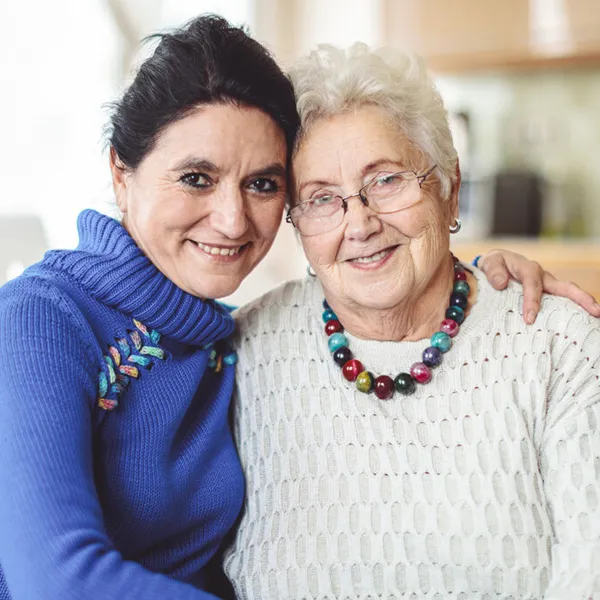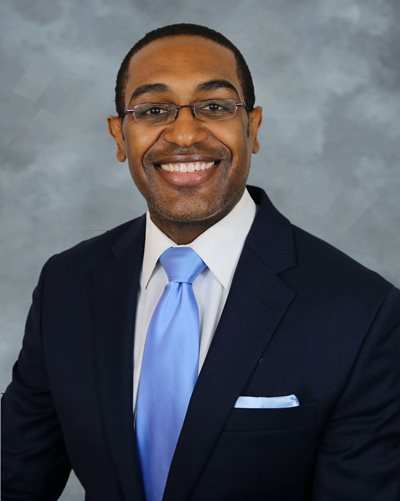
Your Gift Can Make 2x the Impact
Your Gift Can Make 2x the Impact
A gift can go twice as far during our February $100,000 2x Match. Your contribution by Feb. 27 will fuel Alzheimer’s research and help provide essential care and support.
Donate NowCelebrating Physician and Researcher Dr. Antoine Trammell of Emory University
Antoine Trammell, M.D., MPH, of Emory University is an internist and researcher, whose work focuses on understanding the factors contributing to higher incidences of dementia in Black communities. We spoke with Dr. Trammell about his research, the underrepresentation of Black participants in clinical trials, and how he has practiced self-care during the COVID-19 pandemic.
Dr. Trammell, tell us about your background and why you focus on mild cognitive impairment (MCI), Alzheimer’s and other dementias in your research.
As a doctor and philosopher, I like to think that I don’t just observe the human experience through health, but deeply ponder it. After coming to Emory University, some of my relatives developed dementia and passed away, including my paternal grandfather. That was probably the only time in my life that I saw my dad cry. I saw how dementia could steal memories. I witnessed the toll of limited healthcare access on my family. And it frightened me. I saw Alzheimer’s disease fade rich lifetimes to worn bodies with broken minds. I know what these diseases do to people and their families. It hurts. That is why I do what I do.
Tell us about your 2020 Alzheimer’s Association grant and what your study focuses on.
 We already know that older Black Americans have an increased risk of Alzheimer’s disease. And, in general, this population also reports high exposure to stress. My 2020 Alzheimer’s Association Research Grant (AARG) primarily focuses on the safety and tolerability of a common blood pressure medication in older Blacks who have cognitive changes. As a Phase I clinical trial, we monitor both side effects and study dropout rates. My focus on the Black community in this grant is due to the underrepresentation of Black people in research, but overrepresentation in poor health outcomes.
We already know that older Black Americans have an increased risk of Alzheimer’s disease. And, in general, this population also reports high exposure to stress. My 2020 Alzheimer’s Association Research Grant (AARG) primarily focuses on the safety and tolerability of a common blood pressure medication in older Blacks who have cognitive changes. As a Phase I clinical trial, we monitor both side effects and study dropout rates. My focus on the Black community in this grant is due to the underrepresentation of Black people in research, but overrepresentation in poor health outcomes.
Black people are also at increased risk for conditions that affect blood vessel health, like high blood pressure and diabetes. There is evidence of a relationship between stress and blood vessel health, including blood vessels in the brain. A secondary focus of the study is blood pressure medication and potential mechanisms underlying Alzheimer’s disease risk in Black Americans.
Because I live in the Southeast, I see a lot of high blood pressure, memory and thinking issues in the Black population and in the Southeast in general. With that in mind, I wanted to look at vascular factors and whether a blood pressure medication could decrease the incidence of cognitive impairment and dementia in Black people in particular because there is an issue of trust that can lead to Black Americans being understudied.
Let’s talk about that issue of trust and representation in research in the Black community, specifically in clinical trials. What is going well, and what needs to be changed?
Since the transatlantic slave trade, when millions of people were taken from their environment and brought to a different one, the Black community has navigated restrictive circumstances. This includes unequal access to things we take to be inherent rights in our society — and a deep mistrust of societal institutions. Mistrust — specifically when coupled with unequal access to high-quality healthcare — led to avoidance of evidence-based medicine, and a self-reliance on folk remedies and cures.
During the time that Jim Crow laws were in place, there was no place for Black people to get care, and that, combined with racial tension, laid a lasting foundation of mistrust. It did not get any better by 1932 when the Tuskegee Experiment began. Tuskegee and Henrietta Lacks are poignant examples of trespass that dampened Black participation in research, including clinical trials. That foundation of mistrust seemed insurmountable, but it is possible to overcome it. So what do you do?
Representation is a key factor, being able to find a doctor who looks like you and understands you. I spent a year as an OBGYN and it never bothered me when a patient said that they preferred a female doctor. I knew what I needed to know from an academic and a clinical standpoint, but I never experienced what these women had. Likewise, when it comes to clinical trials and research overall, finding yourself talking to a person who looks like you and may be more familiar with your life experience can be comforting, and can establish trust.
It is critical to generate trust through credibility. And what determines credibility? It may seem paradoxical, but both problems and solutions can reside within the people we aspire to treat in medicine and science. It is up to doctors and researchers to engage them and recognize those factors. And with trust, we can accomplish great things together.
The COVID-19 pandemic truly brought the reality of unequal health outcomes to the forefront in an undeniable way. The U.S. is unique, with many languages, ideologies and cultures delicately cohabitating, so the scientific and medical workforce needs to reflect that. The growing recognition of the impact of disparities within medicine and science has certainly been encouraging as we look ahead to the future.
What science are you most looking forward to seeing more progress from in the coming year?
In the field of Alzheimer’s disease and related dementias, I’m thrilled about work to develop anti-amyloid therapies and blood-based biomarkers of Alzheimer’s disease. I would also love to see existing drugs be repurposed to potentially become effective treatments for cognitive impairment, to delay the progression of dementia. It would be great to take something that already exists and make it work. Ultimately, that is what I am trying to do with my grant.
Lastly, I am especially excited by the ongoing efforts of researchers and participants to reflect our nation’s composition through clinical trials.
What does your life look like today, a year since the first U.S. pandemic lockdowns of 2020?
The pandemic has brought constraints, challenges, and fear of illness and loss. It has also brought an opportunity for more family time. I’m a father of four, and children hit significant milestones with each blink. These days have been both rewarding and special, bonding with my kids and creating memories and stories for generations to come.
During the past year, I have also made time to cultivate talents and focus on discipline. I began learning several musical instruments at age 12, guitar being my first. In college, I played in the university jazz band, playing with guys like Billy Cox, the amazing bassist who played with Jimi Hendrix. Many times in college, when I picked up one of my guitars when I was stressed or upset about something, the music I played made me feel better. Playing music became a way to transmute sadness to joy.
Working as a doctor during a pandemic certainly brings moments of sorrow. Playing and writing music helps me redirect those feelings into joy and peace, and has been transformational. Ultimately, learning to take care of myself in significant ways has been an important accomplishment during the pandemic, and has made me a happier person. Self-care is not selfish. It is something we should all do for ourselves.
About: Dr. Trammell is an assistant professor of medicine at Emory University School of Medicine, a physician, researcher, educator and public health professional. His godfather, a fellow Fisk University graduate, was a doctor and the inspiration for Dr. Trammell’s journey into medicine.
Related articles:
Mild Cognitive Impairment
